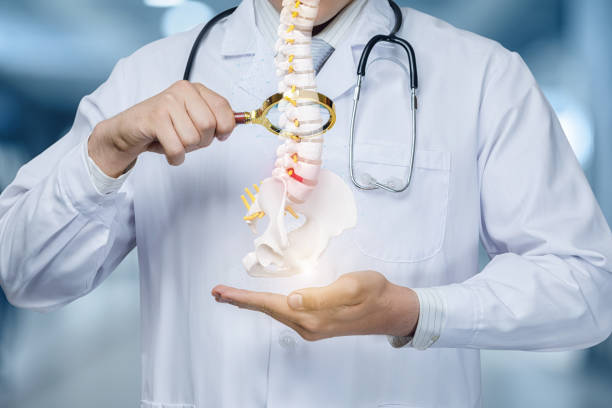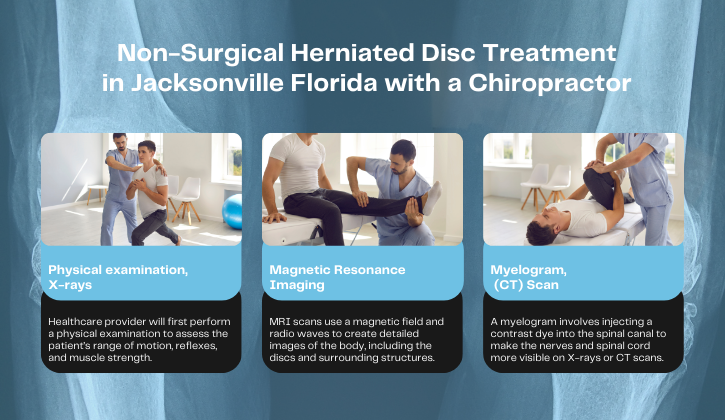Experience lasting relief and improved well-being through our advanced non-surgical herniated disc treatment. Discover a path to recovery with our expert team. If you suffer from a herniated disc, you know how debilitating the pain can be. It can make everyday tasks, like sitting or walking, feel unbearable. Many people think that surgery is the only option for relief, but that’s not always the case. Chiropractic care can be an effective and non-invasive alternative for herniated disc treatment.
Herniated Disc Relief: Non-Surgical Solutions
At Jacksonville Chiropractic, our experienced chiropractors have helped many patients find relief from herniated disc pain without surgery. Our non-surgical approach focuses on spinal adjustments, therapeutic exercises, and other holistic techniques to alleviate the pain and discomfort associated with herniated discs.
During your initial consultation, our chiropractors will conduct a thorough examination to determine the root cause of your pain. Then, we’ll develop a personalized treatment plan tailored to your specific needs. We’ll work with you every step of the way to ensure that you’re comfortable and informed throughout the process.
Non-surgical Herniated Disc Treatment
Our non-surgical herniated disc treatment can help you avoid the risks and expenses associated with surgery while still providing you with effective pain relief. Don’t suffer in silence – contact Jacksonville Chiropractic today to schedule a consultation and take the first step towards a pain-free life.
Herniated Disc Detection: Key Tests Explained
There are several tests that can be used to detect a herniated disc. Here are a few:
- Physical examination: A chiropractor or other healthcare provider will first perform a physical examination to assess the patient’s range of motion, reflexes, and muscle strength.
- X-rays: X-rays can show the alignment of the spine and rule out other potential causes of back pain.
- Magnetic Resonance Imaging (MRI): MRI scans use a magnetic field and radio waves to create detailed images of the body, including the discs and surrounding structures.
- Computed Tomography (CT) Scan: A CT scan uses X-rays to create a 3D image of the spine.
- Myelogram: A myelogram involves injecting a contrast dye into the spinal canal to make the nerves and spinal cord more visible on X-rays or CT scans.
Like Non-Surgical Herniated Disc Treatment, Read More About What Toxins Are Released After a Chiropractic Adjustment
Frequently Asked Questions About Non-Surgical Herniated Disc Treatment
Here are some of the frequently asked questions…
What is non-surgical herniated disc treatment?
Non-surgical herniated disc treatment involves using various conservative methods to alleviate pain and discomfort caused by a herniated disc without resorting to surgery.
What are the advantages of non-surgical treatment?
Non-surgical treatment options for herniated discs offer reduced risk, quicker recovery, and fewer potential complications compared to surgical interventions.
Who is a candidate for non-surgical treatment?
Patients with mild to moderate herniated disc symptoms and those not requiring immediate surgical intervention are usually candidates for non-surgical treatments.
What are the common non-surgical approaches?
Common non-surgical approaches include chiropractic adjustments, physical therapy, pain management techniques, and therapeutic exercises tailored to strengthen the supporting muscles.
How effective are these treatments?
The effectiveness varies from person to person, but many individuals experience significant relief from pain and improved mobility through non-surgical methods.
How long does non-surgical treatment take to show results?
Results vary, but some patients experience relief within a few weeks, while others might need a longer duration of treatment and rehabilitation.
Are there any risks associated with non-surgical treatment?
Non-surgical treatments generally have fewer risks than surgery, but some treatments might have minor side effects. Your healthcare provider can discuss potential risks based on your specific condition.
Can non-surgical treatment prevent the need for surgery in the future?
In many cases, non-surgical treatments effectively manage herniated disc symptoms, reducing or eliminating the need for surgery. However, some severe cases might eventually require surgical intervention.

Can I combine different non-surgical treatments?
Yes, often a combination of treatments like chiropractic adjustments, physical therapy, and exercises can provide a comprehensive approach to manage herniated disc pain.
What should I expect during non-surgical treatment sessions?
Your healthcare provider will design a personalized treatment plan. Sessions might include adjustments, exercises, and education about posture and lifestyle changes.
How do I know if non-surgical treatment is working for me?
Regular communication with your healthcare provider is essential. If you experience a reduction in pain, improved mobility, and better quality of life, the treatment is likely working.
Is non-surgical treatment a permanent solution?
For some individuals, non-surgical treatment can provide long-term relief. However, periodic maintenance sessions or lifestyle adjustments might be needed to manage recurring symptoms.
Conclusion Non-Surgical Herniated Disc Treatment
It’s important to note that not all patients with herniated discs will require imaging tests. In some cases, a physical exam and medical history may be sufficient for diagnosis. However, imaging tests can be useful in confirming the diagnosis and determining the extent of the herniation. Your chiropractor or healthcare provider will determine the appropriate tests based on your individual situation.
About Author
Dr. Jeremiah Carlson is a licensed chiropractor serving the Jacksonville community. Dr. Carlson has been improving Jacksonville’s health for over 15 years. As a chiropractor with experience, Dr. Carlson is committed to finding the proper diagnosis while promoting optimal health and well-being of his patients. Following diagnosis he will evaluate for misalignments in the spine and then use chiropractic manipulation to correct them. Correcting spinal misalignments can reduce joint pain, relax spasmed muscles and calm overactive nerves. Dr. Carlson’s approach is to create balance between the joints, muscles and nerves to reduce or eliminate pain.



